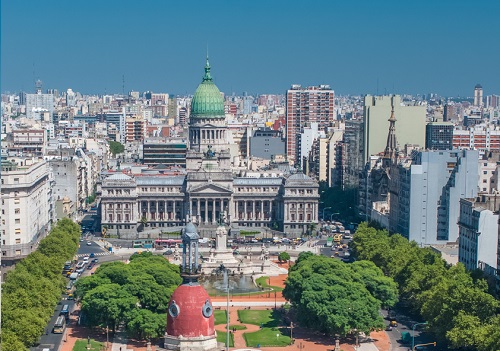Finding reliable and trustworthy banking services is an important part of living and working abroad, and expats will find that, in most countries, a range of options are available. You may wish to maintain a bank account at home, for paying bills and other activities, but you will probably also need a local bank account, in order to receive salary payments and handle your living expenses.In most countries, a range of options are available. It is even possible that your existing bank will have international facilities. Alternatively, you may wish to open an off-shore bank account. Different countries have different rules with regard to banking. In many, it may be that you need a local bank account in order to acquire residence, or that employers can only pay you via a local account. This may also apply if you are self-employed.
The Argentine economy has faced significant challenges in recent years. The local currency, the Peso, fell by 50% against the US dollar in 2018, and it has continued falling since. As a result, local banks are under pressure. Apart from international banks, the majority of Argentine banks are state-owned, and political turbulence has increased anxiety about financial security. Most banks rely on public-sector securities for a stable income, but changes in political policy have caused the value of these to decline in recent years.
So, when choosing a bank, it is important to research its financial status and security carefully. The international banks that operate in Argentina may be your best options, but their numbers are declining. Most of the international banks are Spanish, including Santander and BBVA. At time of writing, Citibank and HSBC also have Argentine branches. The main local banks are Banco de la Nacion Argentina (BNA) and Banco Galicia.
Banks are subject to strict regulation via the Financial Institutions Law (FIL), which is supervised through the Banco Central de la República Argentina. The regulations aim to promote stability in the banking sector, to prevent money laundering and antitrust activities, and to protect consumers.

If you are resident in Argentina, or intend to remain in the country for long periods, a local account will probably be necessary. On top of issues of salary payment and bills, banks charge high fees for using ATMs or bank branches for transactions from foreign bank accounts. In addition, many businesses prefer cash over credit or debit card payments.
Opening a bank account in Argentina can be a complicated and slow process, and the exact requirements for expats vary from bank to bank. Unless you are a citizen, most banks will only let you open a cuenta corriente (current/checking account). To open a cuenta ahorra (savings account), most banks require you to be a legal resident of the country.
If you already have an account with an international bank with a presence in the country, it will probably be simplest to open an account with an Argentine branch. You will still be required to provide proof of identity and fiscal security as well as an audit to prevent money laundering activities, and the local branch will have the final say as to whether you are granted the account.
The official language of Argentina is Spanish, and you will need good proficiency in it to conduct your banking business; most bank staff will not speak English. Most bank accounts are in the national currency, the Argentine Peso, but international banks may also allow you to open a US Dollar account.
The documentation for opening a bank account requires advance preparation, as you must first acquire a number of official forms and certificates. The items required are:
• Your valid passport
• Your Compromiso de Domicilio or Proof of Residence – this is a certificate issued by your local police station or Civil Registry Office
• Proof of employment or proof of reliable and sufficient income if you are retired or self-employed
• A Clave Único de Identificación Laboral (CUIL) or unique personal tax code for someone in employment; Clave Única de Identificación Tributaria (CUIT) or unique personal tax code for someone who is self-employed or running a business; or Clave de Identificación (CDI) or personal identification code – these must be applied for in advance

Most banks require a minimum deposit, though the amount varies from bank to bank. Expect to pay fees on your account, also, though these are usually not high. Major cities usually have plenty of ATMS, but they are scarce in smaller towns and rural areas, so you will need to make sure you carry enough cash. Most banks also offer online banking services.
Banking hours are restricted, and they vary in different parts of the country. Also, they are often shorter in summer, with some banks closing as early as 12.30 p.m. In most of the country, banks are open from 10.00 a.m. to 3.00 p.m. Monday to Friday, but in warmer areas, hours tend to be 7.00 a.m. to 12.00 p.m. They are frequently busy, and you may have to queue.
Useful links
• Banco Central de la República Argentina
• Banco de la Nacion Argentina (in Spanish)
• Banco Galicia (in Spanish)

